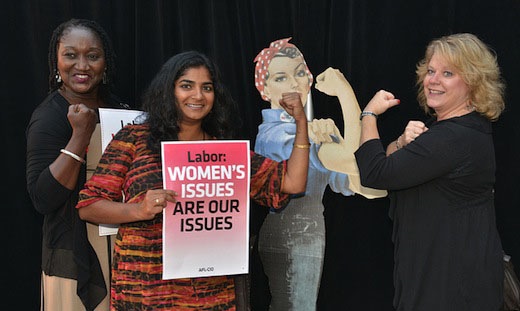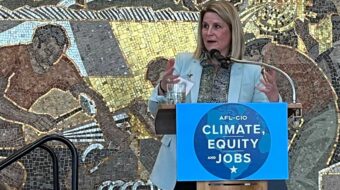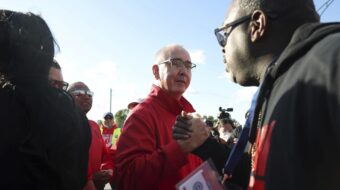
LOS ANGELES – Envisioning a common cause coalition powerful enough to defeat the stranglehold of “entrenched corporate interests” and achieve “shared prosperity,” labor leader Richard Trumka announced an agenda, Sept. 8, that would include many democratic goals.
“We will start doing the work that has to be done whether that work be comprehensive immigration reform or ending the scourge of mass incarceration in America,” the AFL-CIO president said at a press conference on the eve of the federation’s convention opening.
Trumka said that the convention, which aims to forge close ties between labor and a host of progressive organizations, including groups that represent minorities, women, youth, environmentalists, LGBT people and many others, is the result of many months of planning and “doing listening sessions all across this country where we got the good advice of so many.”
He told reporters, some of who were skeptical about labor’s motives in reaching out, that “We do this because none of us is powerful enough to act alone. If our aim is shared prosperity for all, it isn’t going to happen unless we all work together. The entrenched corporate interests are too powerful, especially when you have a Supreme Court that says corporations are people.”
On many of the big issues of the day Trumka said labor is staking out a strong position.
On immigration he said it was not enough that the Congress is working on a bill for comprehensive immigration reform. “The deportations must be stopped immediately,” he declared, “putting an end to the destruction of peoples’ lives.”
He noted that the armistice that ended World War I was signed at 6 a.m. in the morning. “Between then and 1 p.m., when it went into effect, 7,000 Americans died. What a waste of humanity. We can’t let the tearing a part of families continue to happen every day while a bill is being debated. We must stop the deportations now.”
Unsurprisingly, labor leaders gathered here are reminding reporters that the decline in the numbers of union members relates to the unprecedented attacks on the movement all over the country and, of course, to massive economic changes and globalization. For the first time, however, they are examining what it is that the labor movement itself may need to change.
“My mother told me that every time you point the finger of blame,” Trumka said, “three more point back at you. We haven’t done everything right. We need to work hard to correct what we do wrong internally and after we look at ourselves, then we can look externally. We want to embrace change.”
Trumka then went on to blast the power of money in American politics
“We don’t believe that Jefferson said to the other founding fathers that someone with 100 dollars should have 10 times more free speech than someone with 10 dollars. Money does not equal free speech. Money is polluting the political discourse.”
On going to war in Syria, Trumka said the AFL-CIO had not yet taken a stand because it did not believe it has all the facts.
“But I do know this,” he said. “Some 100,000 people have been killed and some 2 million have been forced out of their homes. I do know that these people are not getting the help they need from the international community. I do know the use of chemical weapons is deplorable. The Executive Council will debate this but we haven’t yet made the decision.”
President Obama had been scheduled to speak at the AFL-CIO convention this week but cancelled due to the debates in Congress over whether or not to attack Syria.
“If the president came here the right wing would have been all over him for not paying attention to business in Washington,” Trumka said. “He will send a video message and we know he will strongly support the goals of the labor movement.”
Reporters pressed Trumka on talk of the buildings trades unions being angry about federation moves to work closely with environmentalists. “None of this will stop labor from doing what it has to do – reach out and work together with all groups. None of us have a choice on this. Will there be disagreement among us. Of course, but it doesn’t change the direction in which we have to go.”
“What about the longshore workers pulling out of the AFL-CIO?” Trumka was asked. The ILWU recently withdrew from the federation claiming that other AFL-CIO unions have been crossing its picket lines on West Coast docks.
“Have we done enough to prevent one union from raiding another?” Trumka asked. In some cases we perhaps could be more aggressive on this. But I know for sure that instead of fighting over the 11 percent of the workers who are unionized we need to talk about how to bring the 89 percent who are not.”
Photo: Reaching out to women workers and fighting for their issues at workplace, home and community are a critical piece to labor’s new approach to coalition building (via AFLCIO/Flickr).












Comments